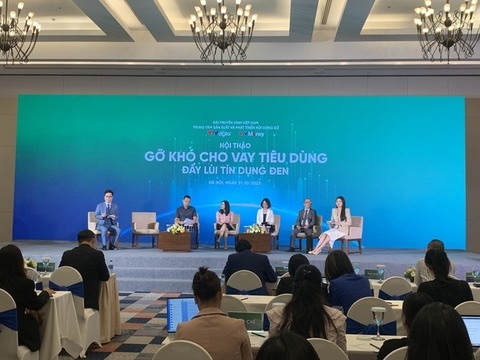Removing barriers to consumer loans an effective way to combat loan sharks
Removing barriers to consumer loans an effective way to combat loan sharks
Removing barriers to consumer loans remains one of the most effective methods to combat loan sharks, heard participants at a seminar in Hà Nội on Tuesday.

Speakers during a panel at a seminar in Hà Nội on removing barriers to consumer loans. — VGP Photo |
Nguyễn Quốc Hùng, deputy chairman and secretary-general of the Vietnam Banking Association (VNBA), said as many low-income workers still have difficulties in accessing proper banking services, finance companies have been a big help in preventing them from falling victim to loan sharks.
However, many companies have been struggling financially in recent years due to rising bad debts and negative perceptions by consumers.
"There have been instances in which borrowers flat out refused to repay, even putting up a fight against collection agents," he said.
Hùng stressed the importance of such companies as they serve as parts of the Comprehensive National Financial Strategy until 2025, with a vision for 2030 approved by the Prime Minister's Office, tasked with developing consumer loan products suitable for low-income workers with suitable interest rates, higher than those from banks but more easily accessible.
In addition, they greatly contribute to the government's effort in combating loan sharks, which has been running rampant, especially affecting the low-income population.
"Some consumers still harbour a misconception that licensed finance companies are operating in the same manner as loan sharks. There have been instances in which they even created groups on social platforms to help others refuse payment, taking advantage of the recent government's crackdown on loan sharks and the black credit market," Hùng said.
It has resulted in rising bad debts among finance companies, with many collection agents quitting their jobs, severely undermining their ability to expand.
According to a recent report by the VNBA, projected debts for the industry have decreased by more than VND60 trillion in comparison to 2022. Without smaller finance companies, low-income workers will be extremely vulnerable to loan sharks.
"We have observed a resurgence of loan sharking activities in recent months, especially on social platforms, despite stronger crackdowns by law enforcement," he said.
At the seminar, industry insiders called for clear legal guidelines to help govern and protect licensed finance companies, as well as sterner measures by the laws for individuals who deliberately seek out ways to refuse to make repayments.
Nguyễn Thị Minh Nguyệt, a deputy CEO from FE Credit, one of the country's leading consumer loan companies, said the company had recorded 24 cases in which its collection agents were assaulted in 2023, a sharp increase from just 2 cases recorded in 2022.
She said that FE Credit and other consumer loan companies do not employ or condone extreme debt collection practices and that FE Credit has consistently operated in compliance with legal regulations stipulated by the State Bank.
Nguyệt attributed borrowers' negative responses to a lack of legal responsibility and financial knowledge, as well as a lack of deterrent in current laws and regulations.
She, however, acknowledged that some collection agents could have made mistakes and caused inconveniences to customers. However, she stressed that they were not the company's policy and that measures are being taken to reduce agents' errors.
Regarding interest rates, a representative from FE Credit said rates are based on various factors including each company's input cost, the amount of collateral, and borrowing terms. As low-income workers could not produce meaningful amounts of collateral, it often meant a higher risk for lenders and therefore, higher rates.

























